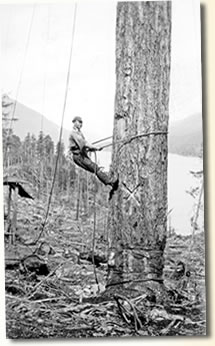Historic Theme Pages
BC History Digitization Project
Logging in the Bella Coola Valley: A Digital Heritage Project by B.C. Central Coast Archives
The project’s theme focuses on the history of logging in the Bella Coola Valley, which is located on the Central Coast of British Columbia.
Logging was one of British Columbia’s first industries, and although changing, it is still of importance. Although the story of logging in the Central Coast of British Columbia is unique, its progression and effects will be familiar to many Canadians who have lived or are living in areas that were shaped by major resource industries. Logging has shaped our landscapes, communities and many people’s lives. Its’ history traversed space, time and cultures.
The history of logging in the Bella Coola Valley is an enticing story that continues to resonate in our community. It begins with the ingenious techniques of the local Nuxalk peoples to harvest trees for personal subsistence. Significant First Nations participation in logging also extended into commercial logging in later years. Some went so far as to start their own logging company prior to the arrival of multi-national companies. Norwegian settlers depended on logging to literally build their communities in the Valley and then to provide much needed income to survive. The history of the commercial logging industry begins in 1898 and traverses the development of local logging cooperatives to the moving in of multi-national corporations. The first sawmill, built in 1898 harnessed a mountain stream for power, and the men hauled logs in with oxen, and when the trunks were too big for their saws they split them with blasting powder. By the 1930’s truck logging began and the high-lead logging systems gave way to diesel-powered logging steel “yarders” in the late 1940s.
Logging history, which is still being made, has come full circle with the development of the Bella Coola Valley Resource Society, which has recently obtained a community forest license. The Nuxalk Nation has also received tenure for a community forest license.
Although commercial activity has been downscaled substantially in the last ten years, recent resurgence at the community level makes its history particularly important.
Logging in the Bella Coola Valley: A Digital Heritage Project by B.C. Central Coast Archives
We acknowledge the financial support of the Department of Canadian Heritage through the Canadian Culture Online Program and the Official Languages Support Program. We also acknowledge the support of the Library and Archives Canada and the Canadian Council of Archives.
We also gratefully acknowledge financial support from the University of British Columbia, University Archives Irving K. Barber Learning Centre.












